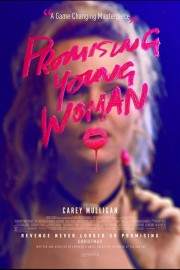Promising Young Woman
Writer-director Emerald Fennell could have derailed this entire film by turning it into a straight-up exploitation film. As “Promising Young Woman” was going, I was thinking about “Peppermint,” which is also about an ordinary woman exacting very personal revenge. That movie is trash, albeit sometimes entertaining trash, but it’s simply an excuse to put Jennifer Garner into “Alias” mode. No one gets off easy in “Promising Young Woman,” and that’s why it holds our attention in every moment it’s going. Few films this year will enrage, or emotionally gut us, quite like this one.
Fennell reveals the tragedy at the heart of “Promising Young Woman” in bits and pieces, not in flashbacks but in scenes and moments of dialogue that will give us a full picture of what happened, and why it left such a painful scar on Cassie, played by Carey Mulligan in one of the best performances of the year. Each scene has a purpose towards not just developing Cassie, and her story, but in illuminating why Nina, her best friend from childhood, is always front-and-center in her mind. There’s a scene with Nina’s mother (Molly Shannon) that is deeply moving both for what isn’t said, but what is; Nina’s mother sees the way Cassie is letting Nina’s memory weigh her down, and she wants her to move on. That she won’t be able to is her noble flaw, but also allows for the closure both her and Nina need. Unfortunately, Nina is not around to be at peace; she took her life several years ago after a sexual assault in med school. Cassie, who also dropped out of med school when Nina did to take care of her, has been living with the anger ever since, and when we meet her, she is moonlighting in bars, looking for men to take that rage out on.
In 113 minutes, Emerald Fennell has made the most damning portrait of rape culture any pop culture medium has ever done. Every guy likes to think of themselves as the “good guy,” someone who would never take advantage of a woman like that. The first few scenes of “Promising Young Woman” show how guys will take advantage of a woman who seems vulnerable, regardless of how “pure” their intentions are. If you’re a guy and uncomfortable with this film and its portrayal of men, or think it’s “unfair to men,” you might want to look in the mirror- Fennell has us down cold, and sees how society has normalized taking the side of men when it comes to rape allegations, even going so far as to have a couple of characters say variations of “boys will be boys.” One of the most gripping scenes in the film, though, is between Cassie and the Dean of her former Med School (played by Connie Britton), and it is a masterclass of exposition and exploring power dynamics. Seeing the way that scene unfolds, we empathize fully with the righteous anger Cassie is driven by. She never forgot Nina, even though the rest of the world seemed to.
When high-profile rape cases and sexual assault allegations are publicized, it’s almost instinct on the case of the media to look at how “unfair” it is to the men accused of such behavior- remember the Brock Turner case? How much of the discussion was about how this was going to ruin his life, even though he had been caught in the act, and his actions would have lasting consequences on his victim. The title, “Promising Young Woman,” is Fennell’s response to that. Her story is about the women whose lives are forever altered, whose futures are sometimes extinguished, in cases of sexual assault. Cassie is their avenging angel, but she’s also one of them, as well; to our knowledge, she has not experienced an assault like Nina did, but she has absorbed her pain, making sure it is not forgotten. At the same time, she is prepared to ruin her life, as well. A potential romance with a former fellow student (Ryan, played by Bo Burnham) offers the promise of a brighter future for her, but it will be the final nail in the coffin for that brightness; her path was long decided, although the way it ends up is not how we expect it to end. That’s what makes it so painful to watch.
If Fennell were to turn the screws of this screenplay a few more centimeters in one direction or another, it would have been another “Peppermint,” and it could have been a wickedly fun piece of exploitation cinema. All you’d have to do is remove the scenes with Cassie’s parents (Jennifer Coolidge and Clancy Brown); the second scene with Allison Brie’s Madison; and the scenes in the coffee shop she works at with Laverne Cox’s Gail, and add some T&A and violence. It wouldn’t have made a great movie, nor would it have made a movie where an entire systemic failing of women would have been quite as out in the open, or as deflating to see so vividly realized. The film’s style in how she shoots and scores the film only accentuates how grounded the rest of the film is. And it will grind you down to pulp by the end; 50% of us need to be for how we’ve allowed the behavior of the worst of us to become so normalized, at the expense of the well-being of the other 50%.










